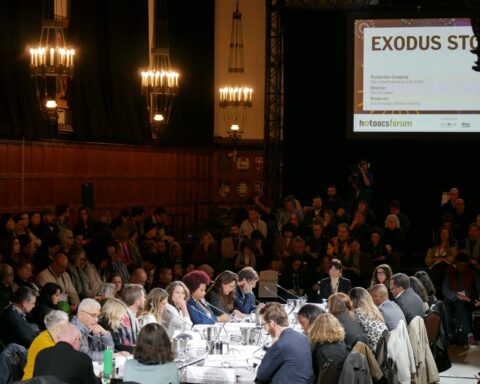This fall, the calls by companies like Netflix not to tax the internet have ramped up. Ordinarily, I would agree with a fight that is purportedly meant to preserve freedom of expression and access to the whole ’net. In this case, as a Canadian nationalist who is tired of seeing an unfair tax system applied by the CRTC to our media industry, I beg to disagree. My argument is that the structural necessity for policy that promotes and protects some kind of space for Canadian stories—without taking away foreign content—is as relevant today as it was in the 1930s. The internet presents challenges, but the structural problem is the same. This seems to confound our resident scold, CRTC chair Jean-Pierre Blais, who apparently thinks that “regulation” has become antiquated thanks to the many “gifts” of the free market.
Consider a blistering speech Blais gave in mid-November in Ottawa at the International Institute of Communications. He dressed down key industry players for not stepping up to compete more forcefully on a global scale. Like a cantankerous parent who can’t shake the kids out of their intransigently spoiled ways, Mr. Blais targeted Rogers and Shaw/Corus for shutting down their video streaming venture, Shomi, which was supposed to be Canada’s answer to Netflix (along with Crave TV), after a mere two years in business. He finger-wagged: “I have to wonder if they are too used to receiving rents from subscribers every month in a protected ecosystem, rather than rolling up their sleeves…to build a business without regulatory intervention and protection.” His ire is comprehensible after all, he gave them a lot of carrots recently—freeing their TV services from fair dealing with indie producers, freeing them from original promises of performance in genre production, etc. How dare they pull up shop?
On the other hand, it’s hard not to be dismayed by Blais’s ignorance or willful denial of a few marketplace challenges that do require intervention. For instance, Netflix had a good four-year lead over Shomi and Crave TV, and compared to Shomi’s 900 thousand and Crave’s 1 million subscribers, Netflix has 5.2 million. And along with other big online media conglomerates (Facebook Canada, Google Canada, and soon Amazon Canada), Netflix does not pay taxes, including HST, while all of us do. According to the Financial Post, they take more than $500 million out of the economy and give nothing formally back.
Another way to look at it is to see that doing nothing (like requiring all companies to pay taxes) is actually doing something: it’s a kind of de facto policy for the benefit of foreign players operating in our space. Ottawa would say the policy of leaving things be with social media conglomerates and OTT (Over The Top) services like Netflix (and soon Amazon), is intended to protect consumers, ever fearful that tax costs will just get passed on to them in the form of higher subscriber fees. (What else is new? Like Rogers et al. never do this?!) This logic is a Harper consumer-protectionist holdover that Blais is committed to, and which Minister Joly may double down on.
Meanwhile, Canadian screen industry businesses and indie producers, especially those involved in documentary and news media production, are left at a distinct disadvantage. We all have to bear the cost of paying HST and corporate taxes, with BDUs (Broadcast Distribution Undertakers) putting a portion of their profits into the Canadian Media Fund pot. As a recent circular by Canadians for Tax Fairness put it, “The European Union, Australia, New Zealand, Japan and other countries have all began to implement laws and regulations that will allow them to collect taxes from these companies, even if they’re not physically located there.” Canada is falling behind.
What could a fund of collected taxes do? It could allow us to top up our content resources so we can compete digitally. I suggest we ignore consumer fears, and zero in on who really is the entitled one in this global picture! The European Union has zeroed in: they recently handed a very pissed off Apple a $14 billion tax bill it claims is owed to Ireland’s 4.6 million residents. And that’s just the beginning, they say.
Finally, if you doubt Blais’s grasp of the facts, consider this. In this same speech he also slammed filmmakers and producers for not selling to the world. According to the Canadian Media Producers Association, the export value of our work is about $3.2 billion. Granted, nearly $800 million of this is used internationally on foreign location shoots and attendant services for the productions. Still, $2.4 billion is a whopping number to be returned to Canadian producers. Just ask doc producers like Ina Fichman (Intuitive Pictures), Peter
Raymont (White Pine Pictures) or Michael McMahon (Primitive Entertainment), whose documentary work is primarily funded by foreign broadcasters (Germany, France, Japan, Israel, America), often for Canadian stories.
Blais’s term ends in June, 2017. Let’s fight to make sure that he’s not renewed.











